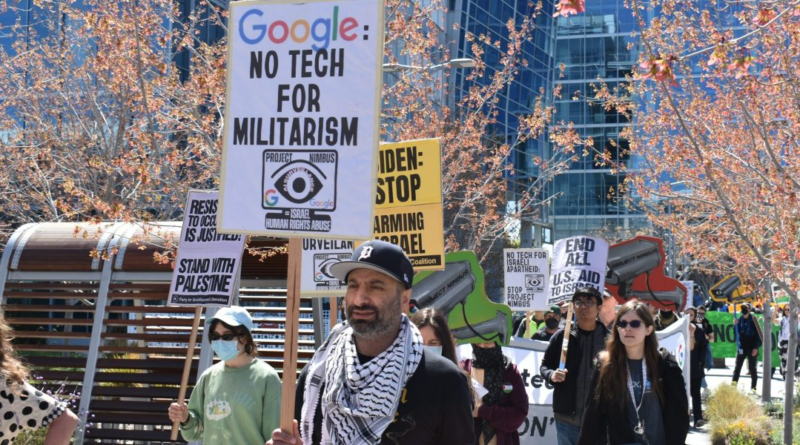Pro-Palestine tech workers push back against Google's cloud project
“Don’t be evil,” was Google’s motto for many years. That all shifted to “do the right thing,” when the tech company became a subsidiary of Alphabet in 2015. Whatever slogan you choose, it seems like a number of Google employees feel their company is breaking its own code of ethics by working with Israel’s government.
This week, Google fired 28 employees, nine of which were arrested for participating in a sit-in protest of the company’s cloud contract with Israel. Google and Amazon both signed a $1.2 billion contract with the Israeli government back in 2021, with the goal of “Project Nimbus” being to supply Israel’s government and military with cloud-computing services.
Not all who were fired were directly involved with the sit-in, according to the group that organized the protests, No Tech for Apartheid. But the Nimbus contract has become increasingly controversial even as the number of Palestinians killed by Israel strikes surpasses 30,000. Recently, a UN expert denounced Israel’s military action in Gaza, calling it amounting to genocide.
“Sundar Pichai and Thomas Kurian are genocide profiteers,” No Tech for Apartheid wrote in a press release. “We cannot comprehend how these men are able to sleep at night while their tech has enabled 100,000 Palestinians killed, reported missing, or wounded in the last six months of Israel’s genocide — and counting.”
Despite Google firing a number of its workers from the No Tech for Apartheid campaign, the group isn’t giving up. “The truth is clear: Google is terrified of us,” it said in the press release, adding that the company’s actions are contradictory to Google’s supposed “open culture.”
No Tech for Apartheid says that in three years of protesting, it has “yet to hear from a single executive about our concerns.”
“These mass, illegal firings will not stop us. On the contrary, they only serve as further fuel for the growth of this movement,” they say. “Make no mistake, we will continue organizing until the company drops Project Nimbus and stops powering this genocide.”
When it comes to the project itself, Google claims in a statement that the work at Project Nimbus “is not directed at highly sensitive, classified, or military workloads relevant to weapons or intelligence services.” But pro-Palestine Google employees point to reporting from Time Magazine, which reveals details from the contract that indicate Google provided cloud services to Israel’s Ministry of Defense.
A Google spokesperson responded to Fortune’s inquiry by asserting that “these protests were part of a longstanding campaign by a group of organizations and people who largely don’t work at Google.” According to the company, a “small number of employees” had caused a disruption and violated company policies by “physically impeding other employees’ work and preventing them from accessing our facilities.” Google says that law enforcement was called after employees didn’t leave after “multiple requests,” and investigations into 28 employees has resulted in their termination, adding Google will continue to “take action as needed.”
No Tech for Apartheid, though, pushes back against Google’s claims, including how Google insists most of the dissenting workers were not employed by Google, or that protesters “defaced property” and impeded other employees, as an excuse to justify its actions. The “firings were clearly retaliatory,” the group says.
No Tech for Apartheid also says the persecution has been leveled more at “our Palestinian, Arab, and Muslim colleagues” than anyone else.
“Workers have the right to know how their labor is being used, and to have a say in ensuring the technology they build is not used for harm,” the protesters said in a separate press release. “Google is depriving us of these basic rights, which is what led us to sit-in at offices across the country yesterday.”




